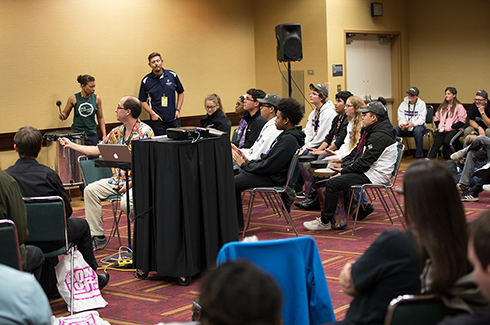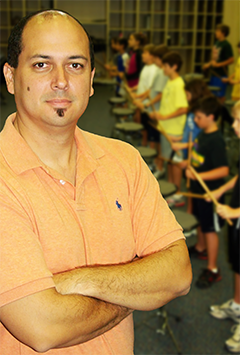by
Rhythm Scene Staff
| Mar 11, 2020

It has been my pleasure to partner over the years with Ralph Hicks on many percussion and percussion education projects. We have presented clinics across the country and co-authored several education publications. In addition to our work together, Ralph is the founder and executive director of Let Them Drum, and I have had the opportunity to watch this program grow from just an idea in Ralph’s head. It is quite the story!
 Eric Rath:First off, Ralph, tell us a little about yourself.
Eric Rath:First off, Ralph, tell us a little about yourself.
Ralph Hicks: I’ve been a PAS member since 1992 and now serve on the Board of Advisors, Education Committee, and as Special Needs chair for the PAS Diversity Alliance. I taught public school percussion and concert band for 19 years in my home state of Texas and am currently a realtor with the Jack Allen Group at Allen Interests, Inc. I live in Magnolia with my wife, Marcail, a band director who I worked with for 10 years, and two kids, Brooklynn and William.
ER: What is Let Them Drum?
RH: Let Them Drum is recreational and therapeutic group drumming experiences for all ages and abilities. We incorporate hand drums, buckets, steel drums—the works. We started out as a school club in The Woodlands, Texas, where I worked in 2010, and we have grown to over 350 members, now in our eighth year as a non-profit.
ER: Let Them Drum has such a great origin story; tell us about that.
RH: It all started while watching a Texans game with my nephew, Luke, who was recently diagnosed on the spectrum. Autism was new to our family, and I couldn’t understand why Luke wouldn’t look at me when I talked to him. I mean, that’s what all the good teachers insist on, right? Common sense, right? WRONG. I eventually got frustrated and just got up, drumming BADUMP BUMP, like “Well that’s that” on my legs. Then, it happened. Luke put his device down, and drummed badump bumpon his legs.
ER: Nice.
RH: You’d think I had just hit a hole-in-one on the golf course! I was looking around for witnesses, like “Did anybody see that?” But, of course, nobody saw! I sat back down, and this back-and-forth continued for about two minutes, then he lost interest and went back into his world. But before he did, he did something I’ll never forget: he looked at me.
ER: He looked at you?
RH: This blew my mind. When you look me in the eye, you see me as a concept, as a face, and can easily carry a conversation. Right?
ER: Right.
RH: Well, when Luke looks me in the eye, he’s studying the different veins, the eyelashes, sees that my eyeballs are uneven, all kinds of information our brains just push to the background. So, if I want his experience with me to be positive, I must accept that he can either look at me or he can listen. He can’t do both. It’s that simple.
ER: That’s fascinating; I had no idea!
RH: It really is! That one little tweak in how I communicate with him has made all the difference.
ER: Knowing your entrepreneurial side, how long was it before the light bulb appeared over your head?
RH: Applying it to a group setting with a mix of kiddos with and without disabilities popped into my head almost immediately. I guess all teachers just naturally view the world through how they can make it better for all kids—not just their own kids. So, a few weeks later we set up a club between my percussion kiddos and our special-needs department. We would meet once a week, and it was a blast!
ER: Are there any other programs around like this?
RH: In our area? None. Houston is a hotbed of powerhouse percussion programs; the level these kids are playing at around town is amazing. But honestly, the similarities end there. If anything, we are the counterculture; we aren’t about the education, we are about the experience.
ER: Public schools understandably focus more on education. What about outside the district? Outside of public school?
RH: Not even there. All over the country you have special-needs little leagues, dance companies, and even proms. But as far as a drumming program with the same goals as ours and open to the same people? The closest thing that I know of would be the Free Players in New York and the Kingpins drumline in Illinois. But even then, I feel like we aren’t as specialized, providing a more unique experience. Somehow, we are still the only game in town, and that’s just fine by me for now.
ER: What did it take to make it happen?
RH: First I had to change my interpretation of the word “achievement,” which up until this point meant technical development, high-level musical expression, and, of course, competition prep. But using drumming to calm an anxious child? To help them learn how to introduce themselves to a stranger? I knew I was out of my wheelhouse, so developing my competency was definitely first on the list.
ER: My background in education certainly didn’t prepare me for something like this. How did you go about developing your competence?
RH: With Google and the PAS network, of course! After just a quick Google search on “drumming therapy” and a few emails out to my PAS family, I was well on my way to better understanding. John Fitzgerald and the PAS Interactive Drumming Committee, Dr. John Lane, and Dr. Hayoung Lim at Sam Houston State University would prove to be invaluable resources. We now have strong connections with local businesses, treatment centers, retirement homes, the American Music Therapy Association, and of course, The Percussive Arts Society.
ER: I’ve noticed that you make the point to say that you aren’t music therapy. Why is that?
RH: People sometimes call us music therapy, but music therapy is a clinical treatment of a specific diagnosis by a board-certified music therapist, or MT-BC. Therapeutic drumming promotes health and wellness and can be done by anybody with a big heart. I’m good with people and at drumming, but taking credit for doing what a music therapist can do is a disservice to both fields. It is worth noting though, that we do have music therapists on staff, and they are amazing!
ER: I totally understand that, and I’m sure music therapists reading this will appreciate that. This got you in hot water before, didn’t it?
RH: Yeah, when I first started out, I would visit with Kalani Das over emails and messages, mischaracterizing “music therapy” without realizing it. So, at his PASIC clinic a few years later, at one point he says, “Just because you’re playing golf with someone with disabilities”—looks right at me—“doesn’t mean you’re doing golf therapy.” Man that stung! But he made his point, and I won’t forget it.
ER: Can anybody join Let Them Drum? What’s the average age?
RH: We have no limits to who can join; if you want to drum, let’s drum! We have members of all ages, currently ages 3–38, but we are most popular with kids ages 5–16.
ER: Tell me about some of the experiences you’ve had with your members. Do any stand out?
RH:It’s been a great ride! We’ve drummed at some pretty cool places with some pretty cool people, and we have been well received everywhere we go. We offer our free weekly drum circles in The Woodlands and Klein, Texas, and take weekend excursions all over town. Some highlights are drumming at Ironman Texas, Houston Rockets and Dynamo halftimes, DCI Soundsport Drumline Battle, Rice University, and the Harlem Globetrotters! We’ve even had two stories about us on local Houston news channels. Our crowning achievement came in 2015, when we presented a clinic on what we do at PASIC in San Antonio! In the percussion world, you know you’ve arrived when PAS calls!
Part Two of this article will talk about more specific experiences with the group, where the organization is headed as it prepares to expand into more chapters, and how you can get involved!